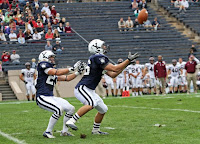 |
| St. Lucy by Domenico de Pace Beccafummi |
|
On December 13th, St. Lucy's Day, in many Scandinavian countries and in Lutheran communities in the United States, young girls wearing crowns of candles and bearing plates of saffron buns--to represent St. Lucy's tortured eyes--come before their families to sing "Santa Lucia." Originally a Neapolitan sailor's song, the words to the Scandinavian versions plea for the return of light and for the release from winter's darkness.
St. Lucy was a fourth-century martyr, condemned to die by fire. As she was dying, her throat was speared to keep her from speaking further. But the spearing was unsuccessful and her words continued.
A sestina is a thirty-line French poetic form of six sestets, ending in a three-line envoi. It's got six repeated words that end each line, following a strict order. It is a hypnotic form, suitable to the strange and mysterious martyr, St. Lucy.
A Sestina for Santa Lucia
Sing of Santa Lucia, envoy of light,
bearing into the solstice her halo
of flame, white-robed and dark-eyed.
Sing of Santa Lucia, martyred by fire,
speared through the throat to silence her speaking.
Listen! What does love call us to hear?
What is in the music we hear?
We sing, but somehow it’s the martyr’s words that plea for
light.
We hear promise in the prayer she is speaking.
Lilting, though plaintive, in lands darkness swallows
she moves among us, a corona of fire,
and sings with a luminous glow in her eyes.
Santa Lucia, with visionary eyes,
called forth from her pyre words few could hear.
The flames leapt at her, the flames of the fire,
upon which she stood martyred and blinded by light.
We imagine her words, more prayer than echo,
and wonder at the meaning of the words she is speaking.
But what are the words she is speaking?
O timeless legend with fire-blinded eyes,
a Nordic spirit with flaming tallows
atop her head singing that we might hear,
she summons from darkness the return of light,
she who was martyred in the brightness of fire.
The one who died from it summons the fire.
But it is not of death she is speaking,
nor is she frightened by the brightness of light.
Though dying, what was left for her eyes
To see, what beyond the fire’s roar could she hear?
Now she is the visionary, fire-hallowed.
In the dark morning, the young girls follow
one after another and stand by the parlor fire
singing “Santa Lucia” for the family to hear--
not the same words Santa Lucia was speaking,
but we see the same plaintive look in their eyes:
Let not the darkness
be more final than the light.
In darkness Santa Lucia’s luminous echo is speaking--
the refining fire lent vision to her dying eyes--
and in deep December we hear the saint’s sweet plea for light.
 I've always felt that Christmas is a greater mystery than even theologians give it credit. There is some kind of Dark Night of the Soul beauty about it, a numinous to it, as if in deep December we encounter the thinnest of the thin places. And that's a quality shared among the December holidays. Just as we herald and summon the slow return of longer days, we marvel, too, that in richest darkness, the colored lights twinkle brightest.
I've always felt that Christmas is a greater mystery than even theologians give it credit. There is some kind of Dark Night of the Soul beauty about it, a numinous to it, as if in deep December we encounter the thinnest of the thin places. And that's a quality shared among the December holidays. Just as we herald and summon the slow return of longer days, we marvel, too, that in richest darkness, the colored lights twinkle brightest. 










